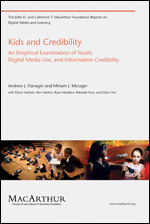
Check out the article, Why Online Learning Should Not Mean Replacing Teachers With Computers, at the MacArthur Foundation website. The post describes an article in the Nation Magazine that examines how online learning companies are manipulating the futures of our children.
I am peripherally involved with a new middle school Khan Academy project. As I’ve watched the program get started and observed the teacher combining her experienced teaching skills with the online opportunities that Khan presents, I am impressed. This dynamic classroom environment combines the best of face-to-face interaction with online learning tools, but the teacher-student connection continues, just as it always has. It’s a joy to watch children work in this setting.
What makes my colleague’s classroom so amazing is how she blends learning resources together — the activities that have always been in her classroom are now expanded with the online Khan materials. And with these additional digital materials she can more easily analyze the needs of her students, reinforce skills, and expand assignments. It’s this blend of rich teaching together with a unique online educational resource, that creates a strong educational environment in her classroom
How sad it will be if some children only have an opportunity to learn online, because the human interaction — and by this I mean the face-to-face moment-by-moment connections and not the digital communications between teacher and student — will never be completely replaced. As one of my colleagues commented recently, blended instruction (a combination of online and connections to real people) will always the easiest way to learn.
We are all living in a time of transformative cultural change. These days teaching — and learning for that matter — seem to be under fire everywhere we look — even in districts with the highest achievement levels in their states. Good digital resources present us with lots of opportunity and the potential to expand and improve the traditional classroom in infinite and exciting directions. Run-of-the-mill digital resources do very little and may, in fact, create more problems.
The bottom line? Continue reading “Good Ed for Kids? Then Don’t Expect Online to Replace Teachers!”


You must be logged in to post a comment.